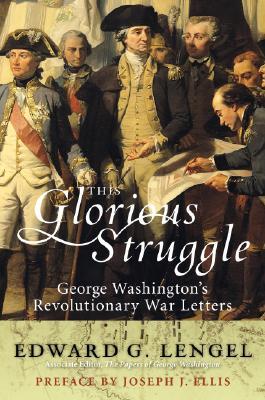This Glorious Struggle: George Washington's Revolutionary War Letters
by George Washington
George Washington wrote an astonishing number of letters, both personal and professional. The majority—about 140,000 documents—are from his years as commander in chief during the Revolutionary War, from 1775 to 1783. This Glorious StruggleThis Glorious Struggle presents a selection of Washington's most important and interesting letters from that time, including many that have never been published.
Washington's lively and often surprisingly candid notes to his wife and family, friends, Congress, fellow soldiers—and even the enemy—chronicle his most critical tactical and strategic decisions, while offering a rare glimpse of the extremes of depression and exultation into which he was cast by the fortunes of war. The letters are arranged chronologically and give a dramatic sense of the major phases of the war, from Boston, Trenton, and Valley Forge, to Monmouth and Yorktown.
The more personal missives show us a Washington who worried about his wife's well-being and who appreciated a good joke and a well-laid table, not to mention the company of the ladies.
This Glorious StruggleThis Glorious Struggle brings Washington to vivid life, offering a fresh and intimate sense of this most towering American figure and the critical role he played in the creation of our country.
Washington's lively and often surprisingly candid notes to his wife and family, friends, Congress, fellow soldiers—and even the enemy—chronicle his most critical tactical and strategic decisions, while offering a rare glimpse of the extremes of depression and exultation into which he was cast by the fortunes of war. The letters are arranged chronologically and give a dramatic sense of the major phases of the war, from Boston, Trenton, and Valley Forge, to Monmouth and Yorktown.
The more personal missives show us a Washington who worried about his wife's well-being and who appreciated a good joke and a well-laid table, not to mention the company of the ladies.
This Glorious StruggleThis Glorious Struggle brings Washington to vivid life, offering a fresh and intimate sense of this most towering American figure and the critical role he played in the creation of our country.
Hardcover, 320 pages
Published February 5th 2008 by Smithsonian (first published February 1st 2008)
© 2025 Bibleportal.com 版权所有.

George Washington was the commander of the Continental Army in the American Revolutionary War (1775-1783) and served as the first President of the United States of America (1789-1797). For his central role in the formation of the United States, he is often referred to as the father of his country.
Washington was baptized into the Church of England. In 1765, when the Church of England was still the state religion, he served on the vestry (lay council) for his local church. Throughout his life, he spoke of the value of righteousness, and of seeking and offering thanks for the "blessings of Heaven."
The Electoral College elected Washington unanimously in 1789, and again in the 1792 election; he remains the only president to receive 100% of the electoral votes.
Washington proved an able administrator. An excellent delegator and judge of talent and character, he held regular cabinet meetings to debate issues before making a final decision. In handling routine tasks, he was "systematic, orderly, energetic, solicitous of the opinion of others but decisive, intent upon general goals and the consistency of particular actions with them.
Washington died in 1799. He has been consistently ranked by scholars as one of the greatest U.S. Presidents.
... Show more